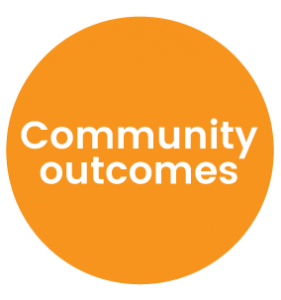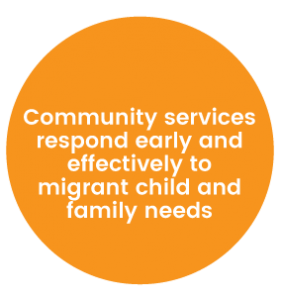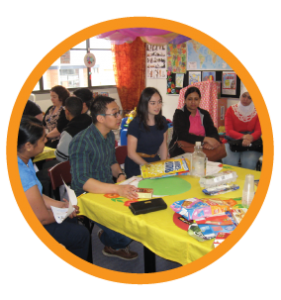Community Outcomes: Connecting Families with Additional Support
Each hub leader needs to establish good relationships with service providers in the local community who have the skills and capacity to support hub families when required.
Many of the parents you work with will have limited knowledge about what support is available. In many cases, a person’s cultural background or family situation may reduce their willingness or ability to ask for help.
Your work through the hub helps to build a bridge between community services and families who otherwise may not access the support they need. Once you have earned the trust of family members, particularly women, you will gradually be able to develop a picture of their situation.
As you learn more about the needs and aspirations of your hub’s families, you will be able to form partnerships with the most appropriate government and not-forprofit organisations in your local area.
Connecting families to additional support ranges from developing relationships with services and their case workers so you can refer people to them for more intensive support, to working with service providers to tailor their programs and have them delivered directly through the hub. Having external organisations delivering your hub programs also frees up more of your time to concentrate on building relationships with families and managing the overall operation of your hub.
Hubs connect with a wide range of government and not-for-profit agencies to deliver programs or make referrals across many specialised services, including:
- early years programs
- maternal and child health
- education and training
- volunteer pathways
- employment
- settlement services
- family support
- family violence
- financial counselling
- accommodation



What works – advice from hub leaders
- Build relationships with key staff, particularly case workers, from local service providers. It’s important to know who you’re referring families to, as you want to feel confident that they will have a positive experience. If you make a referral and a family has a negative experience, this may impact on the trust they have in you.
- Think about key programs, such as a playgroup, and how you can add value to them by inviting service providers to deliver information to parents during these sessions.
- Some organisations may be interested in ‘out posting’ one of their staff to the hub, for example, by having a worker embedded in the playgroup. That way, they get to build relationships with families who may need their services one day, while the parents learn about the support available to them – it’s a win-win!
- It takes time to develop trust-based relationships, so be patient if family members are reluctant to open up to you about the kinds of support they really need.
- Let people know you are there support them whenever they feel ready.
- Once you have referred someone to a support agency, you also need to step back and let that organisation develop it’s own relationship with the family and undertake the necessary case work.
- Develop connections with local settlement providers. Some settlement services will be able to deliver programs directly through your hub.
- Think about how you can introduce school leaders and staff from your school to the local service providers you are building relationships with.
- For example, an organisation may offer a program for school-aged children that could be beneficial for your school. While this falls outside your role, it would be worth checking in with the welfare team and principal to see if it’s an opportunity they wish to follow up.
- Don’t rush to invite agencies to present on sensitive topics. Build trust with families and when they’re ready, they will start asking for specific information.
Alison
“Many parents speak to me about the difficulties they’ve experienced in finding employment after completing training in aged care, child care and nursing. I advocated on their behalf to the local Migrant Resource Centre, with the result of that organisation coming into the hub to deliver a three week program to help families find employment.”
Aneza
Hub leader with the All Saints of Africa Community Hub
Aneza organised for a local service provider to deliver information sessions for women who are newly arrived so they understand their rights – particularly in relation to family violence – and the support available to them in such situations.
This initiative has reached over 70 families and gives them access to a support worker who is outposted at the hub. This means women who have nominated that they require early intervention and assistance in relation to family violence can now receive direct support from a qualified case worker who is based at the hub.
Michelle
St Paul’s Catholic Primary School Hub
Michaelle is often called on to support people when they are at breaking point and in the midst of a financial crisis. They are usually struggling to pay electricity, gas and other household bills; as well as parking and traffic fines.
Instead of dealing with this herself, Michelle refers families to Centrelink, which she has found to be very responsive. Centrelink can provide emergency relief support and follow that up with ongoing financial counselling to help families manage their household budgets.